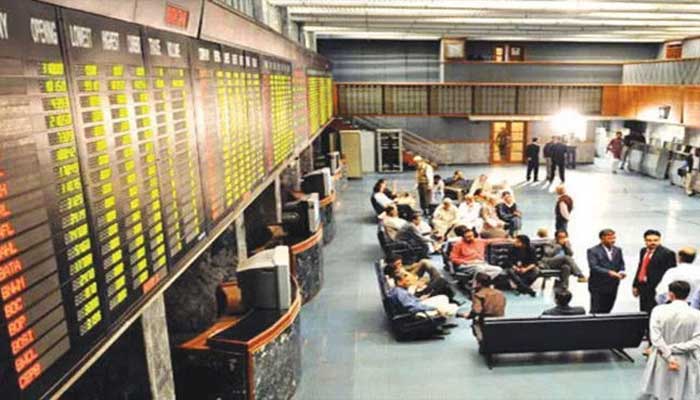Pakistan stock exchange collapses as KSE-100 index tumbles more than 2,000 points
The index nosedived at the start of the trading, shedding 2,106 points (5.51%) before trading was suspended
The Pakistan Stock Exchange’s benchmark KSE-100 index plunged 2,106 points on Monday, 45 minutes after the starting bell on the first day of the trading week, reported Geo News.
The index, which had closed at 38,220 points on Friday, nosedived at the start of the trading, shedding 2,106 points (5.51%) before trading was suspended.
The slump was triggered amidst a global sell-off on coronavirus fears and spreading contagion from a creeping economic slowdown.
“PSX has triggered a market halt at 9:37am which will last for 45 minutes," the management wrote in a press release.
"The market halt is triggered as a standard protocol for risk management purposes,” a statement from the bourse said.
'Temporary setback'
Khurram Schehzad, CEO at Alpha Beta Core, noted that the market was under pressure after oil prices witnessed their biggest one-day drop.
"It is a big positive for Pakistan, as oil prices at these levels would result in $4-5 billion in savings," he said.
"The outlook for the market is positive given the expected decline in [Pakistan's] energy imports and trade deficit; inflation and interest rates; energy and leverage costs; potential to improve indirect taxes and reduced subsidy," he explained.
Muhammad Sohail, CEO at Topline Securities, had similar views, noting hat the oil import bill could drop by $3-4bn a year as oil prices sink to multi-year lows.
"Lower oil prices and the declining trend in inflation numbers hint at an early rate cut, which would be a big positive for the market," he said.
What is Market Halt?
“Market halt” procedure has been introduced by the Securities and Exchange Commission of Pakistan in PSX regulations in December of 2019. The action triggers when the KSE-30 index moves 4 % either way and remains there for 5 consecutive minutes.
The objective of introducing market halt is to safeguard investors and market participants during volatile markets. During this halt, trading in all securities remains temporarily suspended in order to ensure a cooling off period and run a mark to market activity as a risk management measure.
Asian markets collapse
The crash also was triggered amidst a global sell-off on coronavirus fears and spreading contagion from a creeping economic slowdown, as well as a crude oil price war between Saudi Arabia and Russia.
Trading floors were a sea of red across Asia, with Tokyo, Sydney and Manila plunging around 6%, while Hong Kong shed 3.5% by lunch.
Mumbai, Singapore, Seoul, Jakarta and Wellington were more than 3% down, Shanghai and Taipei shed at least 2% and Bangkok gave up 5%. The losses tracked sharp falls in Europe and Wall Street on Friday.
Global market collapses
Around the globe, equity markets collapsed as the rapidly-spreading coronavirus fans fears over the global economy, while a crash in oil prices added to the panic, with energy firms taking a hammering.
As the deadly disease claims more lives around the world, dealers are fleeing out of riskier assets and into safe havens, sending gold and the yen surging and pushing US Treasury yields to new record lows.
Driving the declines was a ferocious sell-off in the oil markets, sparked by top exporter Saudi Arabia slashing prices — in some cases to unprecedented levels — after a bust-up with Russia over production.
Oil down about 20% after Saudi price cuts
Oil plunged about 20% Monday after Saudi Arabia made deep price cuts following a failure by OPEC and its allies to strike a deal to support energy markets.
The two main contracts were both down about 20%, with West Texas Intermediate sliding to about $32 a barrel and Brent crude to about $36 a barrel.
A meeting of main producers was expected to agree to deeper cuts to counter the impact of the coronavirus — but Moscow refused to tighten supply.
In response, Riyadh slashed its price for April delivery by $4-$6 a barrel to Asia and $7 to the United States.
Russia's decision not to comply had already battered prices and there are warnings that prices could continue to drive lower if the two sides do not reach an agreement.
"It's unbelievable, the market was overwhelmed by a wave of selling at the open," said Andy Lipow, at energy consultancy Lipow Oil Associates.
"OPEC+ has clearly surprised the market by engaging in a price war to gain market share."
Jeffrey Halley, senior market analyst at OANDA, said: "Saudi Arabia seems intent on punishing Russia.
-
Bitcoin crashes below $63K as regulatory pressure and market fears grow
-
Bitwise Crypto Industry innovators ETF: What investors should do in 2026?
-
Nintendo shares slide again as momentum fears grow
-
Gold, silver prices fallen sharply; What’s driving the drop?
-
Gold’s record climb: Experts question if its safety is ‘overstated’
-
Dubai unveils plans to construct street built with real gold
-
Netflix slams Paramount’s bid: 'Doesn't pass sniff test’ as Warner battle escalates
-
Ubisoft: Shares plunge amid restructuring plan and wave of games cancellations












